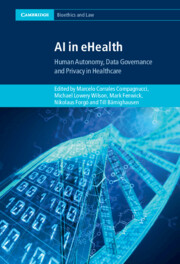Book contents
- AI in eHealth
- Cambridge Bioethics and Law
- AI in eHealth
- Copyright page
- Contents
- Contributors
- Preface
- Acronyms
- 1 Mapping the Digital Healthcare Revolution
- Part I Platforms, Apps and Digital Health
- Part II Trust and Design
- Part III Knowledge, Risk and Control
- 8 The Principle of Transparency in Medical Research
- 9 The Next Challenge for Data Protection Law
- 10 A Global Human Rights Approach to Medical Artificial Intelligence
- Part IV Balancing Regulation, Innovation and Ethics
- Index
- Cambridge Bioethics and Law
- References
9 - The Next Challenge for Data Protection Law
AI Revolution in Automated Scientific Research
from Part III - Knowledge, Risk and Control
Published online by Cambridge University Press: 08 September 2022
- AI in eHealth
- Cambridge Bioethics and Law
- AI in eHealth
- Copyright page
- Contents
- Contributors
- Preface
- Acronyms
- 1 Mapping the Digital Healthcare Revolution
- Part I Platforms, Apps and Digital Health
- Part II Trust and Design
- Part III Knowledge, Risk and Control
- 8 The Principle of Transparency in Medical Research
- 9 The Next Challenge for Data Protection Law
- 10 A Global Human Rights Approach to Medical Artificial Intelligence
- Part IV Balancing Regulation, Innovation and Ethics
- Index
- Cambridge Bioethics and Law
- References
Summary
A considerable amount of literature has been published on autonomous vehicles, robotics in healthcare, and the danger of losing jobs and human control as a result of automation. However, there has been relatively little discussion about how AI might change scientific research. AI-assisted scientific research is already offering a significant boost to the process of scientific discovery. Not surprisingly, this radical change in scientific research will have significant consequences. First, if the research process becomes automated, it may be conducted by anyone, which puts citizen science in a new context. Just as developments in hardware and software made personal computers feasible for individual use, automated research may affect science in the future. Second, unlike researchers, AI and neural networks cannot explain their thinking yet. The fully automated research expands the ‘black box’, making oversight and ethical review problematic in systems opaque to outside scrutiny. Automated research raises many further questions about regulation, safety, funding and patentability. This chapter will focus on the issues connected with privacy and data protection, from the EU GDPR point of view.
- Type
- Chapter
- Information
- AI in eHealthHuman Autonomy, Data Governance and Privacy in Healthcare, pp. 251 - 276Publisher: Cambridge University PressPrint publication year: 2022
References
- 1
- Cited by

